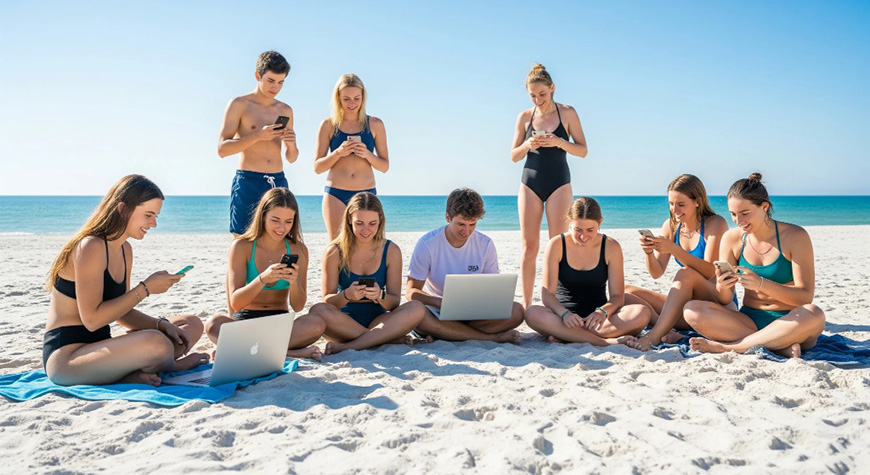New generations and bleisure
Bleisure, a major trend redefined by new generations
"Bleisure," a portmanteau of "business" and "leisure," represents a major evolution in business travel, integrating professional obligations with leisure activities and personal pleasure. This hybrid approach allows professionals to extend their stays to explore, relax, or enjoy their destination beyond their professional commitments. Although the concept emerged in the early 2000s, the term "bleisure" was officially coined in 2009. This trend has significantly intensified after the Covid-19 pandemic, driven by the widespread adoption of remote work and increased corporate flexibility. The bleisure market, valued at $150 billion in 2021, is expected to reach $360 billion by 2027, with even more optimistic projections of $731.4 billion by 2032.
 Driven by new generations, the bleisure trend offers significant benefits for employees and for employers
Driven by new generations, the bleisure trend offers significant benefits for employees and for employers
New generations, drivers of bleisure
Younger generations, particularly Generation Y (25-34 years old) and Generation Z (born between 1997 and 2012), are the primary adopters of bleisure. For example, 36% of 25-34 year olds practice bleisure, compared to only 18% of 40-50 year olds. Millennials are more inclined to extend their business trips (86%) than Generation X (76%) or baby boomers (73%). This affinity is explained by their search for a better work-life balance, their desire to travel and discover, and their familiarity with technologies facilitating remote work. Millennials, pioneers of the digital age, spend an average of 7.5 hours per day online and seek quality of life at work, social engagement, and meaning in their professional activities. They place paramount importance on their mental health and work-life balance. A study reveals that 50% of Millennials plan a personal trip around a business trip, and 76% are more likely to accept a business trip if the possibility of extending it is offered.
 Millennials are more inclined to extend their business trips
Millennials are more inclined to extend their business trips
Generation Z, having grown up in a hyperconnected world and spending nearly 10 hours a day online, is strongly influenced by social networks and influencer recommendations, prioritizing immersive, visual, and "shareable" experiences. For them, safety is a more important criterion than cost when booking accommodation, and they seek unique experiences based on positive reviews. They are also sensitive to environmental concerns (56% prefer ecological accommodations) and wish to connect with their cultural heritage (26%). Professionally, they value remote work and flexible hours, competitive salaries, a fulfilling environment, and attention to mental health.
Despite their specificities, these two generations share converging priorities towards bleisure: work-life balance, flexibility, and the search for unique experiences. Bleisure meets their need for mental well-being by offering a refreshing break, reducing stress and fatigue associated with business travel.
Advantages and impact of bleisure
Bleisure is not limited to individual benefits; it has become a strategic lever for businesses. As mentioned above, a high percentage of bleisure travelers (79%) more often volunteer for business trips if they can extend their stay. Nearly 100% of business travelers appreciate the time spent traveling when leisure opportunities are included. A notable aspect is that 34% of business travelers report having had their most innovative ideas during a business trip, a figure that reaches 53% for Generation Z (16-24 years old). This change of environment and the relaxation inherent in bleisure stimulate creativity and innovation. Companies can capitalize on this observation by promoting bleisure not only as a benefit but as a tool for innovation. Bleisure improves employee satisfaction and productivity. It can also reduce transportation costs and benefit from preferential hotel rates for long stays. Furthermore, it strengthens professional relationships by fostering informal moments with colleagues and clients. For employees, bleisure allows for a better work-life balance, enhanced mental well-being, and flexibility in organization. For example, 93% of people practicing bleisure declare themselves satisfied with their quality of life, compared to 75% for others.
 Despite the challenges,bleisure is set to become the norm
Despite the challenges,bleisure is set to become the norm
Challenges and perspectives
The bleisure trend profoundly modifies the boundary between professional and personal life, making it more fluid and flexible. Work can intrude on leisure time and vice versa, hence the need for clear communication between employers and employees to define the rules of the game. Without this organization, the boundary can become a source of confusion, overload, or a feeling of intrusion. The development of bleisure is favored by increased work flexibility (remote work), favorable company policies, adapted offers from travel industry players, and the use of technology (AI, mobile applications). Bleisure is not a fleeting fad, but a lasting transformation destined to become the norm in business travel. The global bleisure market is experiencing "explosive" growth, with a 76% increase in 2023. A majority of professionals (55%) expect to travel more for work in the next five years. Artificial intelligence will be able to personalize restaurant and activity recommendations, and travel management applications will facilitate the separation of professional and personal expenses. The proliferation of digital nomad visas also offers new opportunities for extended stays.
Bleisure is part of a broader shift in the relationship to work, characterized by an increased search for flexibility, mobility, and personal fulfillment. Companies that adopt it position themselves as modern employers concerned about the well-being of their employees, a major asset for attracting and retaining talent. The distinction between "business travel" and "leisure travel" is blurring, giving way to "integrated travel." This means that tourism stakeholders and businesses must design offers and policies that recognize this fluidity. The emergence of a "traveler citizen" concerned with authenticity, sustainability, and connection with cultural heritage, combined with the flexibility of bleisure, suggests a deeper aspiration than the mere consumption of services.
Bleisure, a structural component of modern business travel
Driven by new generations, the bleisure trend offers significant benefits for employees in terms of well-being, motivation, and creativity, and for employers as a strategic tool for attracting and retaining talent. Despite the challenges related to managing the boundaries between work and leisure, bleisure is set to become the norm, requiring continuous adaptation and strategic integration from all stakeholders to shape a more harmonious, productive, and fulfilling future for professionals.